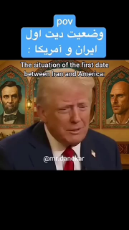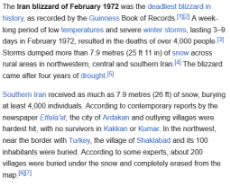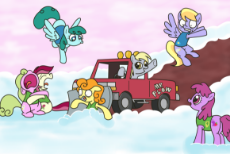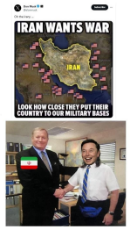"What about Iran?"
(Like the episode "What About Discord?")
Frankly, Iran feels like Discord itself:
A chaotic, unpredictable, lively, paradoxical land — yet deeply serious and powerful underneath.
The Iranian people share this character too:
They survive crises with laughter and resilience.
They don't easily collapse under stress because they’ve seen too much.
Today, negotiations between Iran and the U.S. are happening in Oman.
Inside Iran, however, the public is barely reacting.
Reformists show up mostly for appearances, while conservatives eagerly wait to blame them if talks fail.
The general public watches all this like bored viewers of a long, never-ending TV series.
This indifference shouldn't be misunderstood.
The political culture of Iranians is complicated:
They mock their politicians, yet when the homeland is threatened, they unite instantly.
They're like veteran politicians who, after decades of dealing with politics, simply laugh and say,
"Politics is a donkey!"
When Trump threatened Iran with military action after the Ain al-Asad missile strike,
the Iranian people mostly laughed it off.
Even during those tense nights, they didn't panic; many were even curious to "see how a war would unfold" — almost like watching a new TV season.
They don’t fear chaos — they live with it comfortably.
They’re not idle people to get overly entangled in fear;
they manage their lives, work, and studies while casually discussing international politics like seasoned analysts.
In the Iranian spirit, even war is treated with humor:
One example is the famous movie "Ekhrajiha", a war comedy that became a huge box office success.
Real-life examples are even more fascinating:
When clashes happened between Armenia and Azerbaijan, some Iranian villagers grabbed sunflower seeds and went to watch —
as if attending a neighborhood match!
This laid-back chaos is part of Iran’s social DNA.
A good case study is the recent Shahid Rajaee Port explosion.
It caused serious damage and triggered various theories: sabotage, cyberattacks, foreign plots...
However, with 90% certainty, the cause turned out to be human error.
Yet, people didn't descend into panic.
Instead, they respectfully mourned the victims and showed humanitarian cooperation —
proving that beneath their humor and chaos, a deep culture of empathy thrives.
Beyond politics and society, Iran itself is a chaotic miracle:
The weather in Iran is famously unpredictable.
This land has witnessed some of the most extreme weather phenomena in the world:
The 1972 Iran Blizzard, the deadliest snowstorm in human history;
The Dasht-e Lut desert, which records some of the highest surface temperatures on Earth;
The city of Ahvaz, among the hottest inhabited places on the planet.
And let’s not forget the legendary Tabas Sandstorm:
A sudden, miraculous sandstorm destroyed America's Operation Eagle Claw during the Iran hostage crisis —
despite the weather forecast being perfectly clear that day!
For some Iranians, this event became a symbol of divine protection.
Iran's culture is full of paradoxes:
The deeply ingrained custom of Taarof — a complex form of politeness that bewilders foreigners.
The unique way of reading money:
For instance, 100,000 Iranian rials are not read as "one hundred thousand," nor as "one hundred rials," nor as "ten thousand tomans,"
but simply as "ten tomans" in daily conversation!
All these contradictions make Iran impossible to predict —
even for the most experienced politicians.
Since before the 1979 revolution, the Americans have struggled to "figure Iran out."
When the U.S. embassy was seized by students, even Iran's own Prime Minister was so shocked he resigned!
Iran’s behavior doesn’t fit into standard templates —
which is why Iran today resembles Discord more than ever:
wild, unpredictable, and utterly unforgettable.
Oh I almost forgot it, yesterday was Persian Gulf National Day, and I warmly congratulate all Iranians.
You are the proud heirs of the ancient Aryan civilization.
And to those who try to rename the Persian Gulf with their oil money:
You cannot erase the legacy of the Aryans with money!
The Persian Gulf has always been — and will always be — Persian.
/mlpol/ - My Little Politics
27 replies | 9 files | 13 UUIDs | Page 8
1746052023_1.mp4 (3.0 MB, Resolution:360x640 Length:00:00:16, InShot_20250430_185236038.mp4) [play once] [loop]

1746052023_2.mp4 (4.9 MB, Resolution:360x640 Length:00:00:34, InShot_20250430_195500479.mp4) [play once] [loop]

1746052023_3.mp4 (3.2 MB, Resolution:360x640 Length:00:00:19, InShot_20250430_180629086.mp4) [play once] [loop]


hi anon,thanks for caring about us when no one really does
iran is a gotham with no batman
-
here we don't really hate America nor EU powers
other than our own government
and we never wanted to be an enemy toward anyone really
we even were ally with US once
but things are changed and that is how it is now
--
i can only with the best for all of us
iran is a gotham with no batman
-
here we don't really hate America nor EU powers
other than our own government
and we never wanted to be an enemy toward anyone really
we even were ally with US once
but things are changed and that is how it is now
--
i can only with the best for all of us
okay i think i got baited , are you iranian as well anon?!!?!
>hi anon,thanks for caring about us when no one really does
Hi. You're welcome, but I think most Iranians care — they're just too busy to say it.
>iran is a gotham with no batman
I think Iran is more like Wonderland with no Alice.
>here we don't really hate America nor EU powers
Yeah, bro. Iranians aren't a people who hate anyone for no reason. But I'd drop the word "powers" here. While Iranians generally don't hate anyone, if someone acts hostile towards Iran, we do react. Talking about European and American governments is a different story, though. It's tied to the political games between our government and theirs. But Iranian people themselves don't have any real issue with ordinary people from other countries.
>other than our own government
Of course. Our government has done more harm than anyone else, and people are reacting — though not loudly or dramatically. Most people didn't get too involved in the protests of '78, '88, '98, and 1402 — partly because they were too busy surviving, and partly because they knew it wouldn't end in their favor, but in the favor of a few specific groups.
Trying to change the government is a good idea, of course, if we were not in the Middle East! Some are waiting here for a regime change, just to jump in and benefit before a new government can properly establish itself — whether through military attacks or political influence. Right now, the Arabs in Saudi Arabia and the Emirates, and the Israelis, are sharpening their teeth against Iran. Unfortunately, changing the government in such a situation is not in the best interest of the country, something that the Iranian people have also somehow come to.
So the best way is to reform the government. This idea that the government can't be reformed and must be completely uprooted is mostly the invention of certain interested parties and a group of ignorant people. The reality is that we cannot really deny the difference between the 30 years before and now; time is killing old radicals. Certainly, reforming the government, if done correctly, is doable and is much safer and more logical, and is in line with the Discord-like spirit of the Iranian people.
So yes, we have a problem with the government; but at the same time we are trying to fix it, the chaos theory of the Iranians!
>and we never wanted to be an enemy toward anyone really
Same, bro.
>we even were ally with US once
Yes, we were. But as I said, Iran is too unpredictable to be easily allied with. In fact, one of the reasons for the 1979 revolution was Carter's miscalculations regarding Iran, which partly paved the way for the revolution.
>but things are changed and that is how it is now
Time is like Iran, and like Discord — always changing and unpredictable.
>i can only wish the best for all of us
Thanks for that. Hope things get better...
>okay i think i got baited , are you iranian as well anon?!!?!
Haha, exactly!
Hi. You're welcome, but I think most Iranians care — they're just too busy to say it.
>iran is a gotham with no batman
I think Iran is more like Wonderland with no Alice.
>here we don't really hate America nor EU powers
Yeah, bro. Iranians aren't a people who hate anyone for no reason. But I'd drop the word "powers" here. While Iranians generally don't hate anyone, if someone acts hostile towards Iran, we do react. Talking about European and American governments is a different story, though. It's tied to the political games between our government and theirs. But Iranian people themselves don't have any real issue with ordinary people from other countries.
>other than our own government
Of course. Our government has done more harm than anyone else, and people are reacting — though not loudly or dramatically. Most people didn't get too involved in the protests of '78, '88, '98, and 1402 — partly because they were too busy surviving, and partly because they knew it wouldn't end in their favor, but in the favor of a few specific groups.
Trying to change the government is a good idea, of course, if we were not in the Middle East! Some are waiting here for a regime change, just to jump in and benefit before a new government can properly establish itself — whether through military attacks or political influence. Right now, the Arabs in Saudi Arabia and the Emirates, and the Israelis, are sharpening their teeth against Iran. Unfortunately, changing the government in such a situation is not in the best interest of the country, something that the Iranian people have also somehow come to.
So the best way is to reform the government. This idea that the government can't be reformed and must be completely uprooted is mostly the invention of certain interested parties and a group of ignorant people. The reality is that we cannot really deny the difference between the 30 years before and now; time is killing old radicals. Certainly, reforming the government, if done correctly, is doable and is much safer and more logical, and is in line with the Discord-like spirit of the Iranian people.
So yes, we have a problem with the government; but at the same time we are trying to fix it, the chaos theory of the Iranians!
>and we never wanted to be an enemy toward anyone really
Same, bro.
>we even were ally with US once
Yes, we were. But as I said, Iran is too unpredictable to be easily allied with. In fact, one of the reasons for the 1979 revolution was Carter's miscalculations regarding Iran, which partly paved the way for the revolution.
>but things are changed and that is how it is now
Time is like Iran, and like Discord — always changing and unpredictable.
>i can only wish the best for all of us
Thanks for that. Hope things get better...
>okay i think i got baited , are you iranian as well anon?!!?!
Haha, exactly!
Thanks, bro. Let’s keep walking through this chaos. Better days will come...
Yes, that's right. I was surprised that there are Iranians here. I found this site from my chats with neo-Nazis, I didn't expect Iranians here.
>>388808
if you know more Iranians who enjoy pone (and natzis) invite em in this thread or maybe we can make one thread for iranian natzi bronies if they were as much as population to worth make a thread for
if you know more Iranians who enjoy pone (and natzis) invite em in this thread or maybe we can make one thread for iranian natzi bronies if they were as much as population to worth make a thread for
I know a bunch of Iranian Nazis, but ponies aren't really their thing. As you already guessed, finding Iranians who don't think of MLP as "kids' stuff" is like finding an alicorn!
>>388810
weirdly enough... i know bunch
i will try to send em here in the mean time
after power outage ofcourse...
also an advice use anonymous - leave the name blank
it is the non-written rule of 4chan and altchans
weirdly enough... i know bunch
i will try to send em here in the mean time
after power outage ofcourse...
also an advice use anonymous - leave the name blank
it is the non-written rule of 4chan and altchans
Sure thing, anon. No names, just hooves and chaos. Stay safe in the dark, bro.
Israel and Iran are at it again.
https://www.msn.com/en-us/news/world/israel-readying-massive-response-to-houthis-and-iran-after-airport-missile-attack/ar-AA1E9BRn
>Prime Minister Benjamin Netanyahu indicated that Israel will respond to the Houthis after the Yemeni rebel group launched a missile at the country's main airport on Sunday.
https://www.msn.com/en-us/news/world/israel-readying-massive-response-to-houthis-and-iran-after-airport-missile-attack/ar-AA1E9BRn
>Prime Minister Benjamin Netanyahu indicated that Israel will respond to the Houthis after the Yemeni rebel group launched a missile at the country's main airport on Sunday.
>The 1972 Iran Blizzard, the deadliest snowstorm in human history
>resulted in the deaths of over 4000 people
>about 200 villages were buried under the snow and completely erased from the map
I'm just learning about this now what the FUCK
>resulted in the deaths of over 4000 people
>about 200 villages were buried under the snow and completely erased from the map
I'm just learning about this now what the FUCK
>Israel and Iran are at it again.
Israel and Israelis inside Iran are at it again.
FTFY.
Iranistallions: Which "government" of yours do you hate? Looking in from the distant outside, things have been pretty cosy until recently when Christians started getting hunted down and slaughtered. Personally, I'd hate what you have now instead of earlier.
Israel and Israelis inside Iran are at it again.
FTFY.
Iranistallions: Which "government" of yours do you hate? Looking in from the distant outside, things have been pretty cosy until recently when Christians started getting hunted down and slaughtered. Personally, I'd hate what you have now instead of earlier.
>>389137
Given the current situation in the region, nothing comes as a real surprise.
Iran–U.S talks in Oman are in a deep coma, and tensions between Houthis and Israel are steadily rising.
But hard experience teaches us that "on the edge of war" is a default setting.
Everything is always ready to explode, yet somehow, that final step is often left untaken.
Inside Iran, many are eagerly waiting for a "decisive response" at the first spark.
But the reality on the ground is messier:
Will Israel strike directly?
Will the U.S choose to stay out?
Can Russia keep Iran calm?
Since October 7, the whole regional board has shifted:
Hezbollah is no longer the giant it used to be.
Hamas? Frankly, it was never truly aligned with Iran, they merely cooperated at times out of mutual interests, and now they’re drifting apart again.
The Muslim Brotherhood? They've always kept their distance from Tehran.
And Assad? He’s out. Replaced by groups like Hay'at Tahrir al-Sham, who would probably rather hug a cactus than shake hands with Iran.
At this point, Houthis are the only remaining loyal proxy Iran has left.
If Israel escalates against them, it’s unlikely Iran will just sit back.
If war breaks out, expect a rapid back-and-forth:
Houthi and Iranian targets hit, Israeli and U.S bases under fire in response.
Meanwhile, here on the shores of the Persian Gulf, we’re sitting back, sipping tea, waiting for the new season of Middle East: The Series.
The only real question is:
What’s the title this time?
Game of Drones or maybe House of Fights?
You know, in the Middle East, there’s no true final, just an endless string of new seasons.
Given the current situation in the region, nothing comes as a real surprise.
Iran–U.S talks in Oman are in a deep coma, and tensions between Houthis and Israel are steadily rising.
But hard experience teaches us that "on the edge of war" is a default setting.
Everything is always ready to explode, yet somehow, that final step is often left untaken.
Inside Iran, many are eagerly waiting for a "decisive response" at the first spark.
But the reality on the ground is messier:
Will Israel strike directly?
Will the U.S choose to stay out?
Can Russia keep Iran calm?
Since October 7, the whole regional board has shifted:
Hezbollah is no longer the giant it used to be.
Hamas? Frankly, it was never truly aligned with Iran, they merely cooperated at times out of mutual interests, and now they’re drifting apart again.
The Muslim Brotherhood? They've always kept their distance from Tehran.
And Assad? He’s out. Replaced by groups like Hay'at Tahrir al-Sham, who would probably rather hug a cactus than shake hands with Iran.
At this point, Houthis are the only remaining loyal proxy Iran has left.
If Israel escalates against them, it’s unlikely Iran will just sit back.
If war breaks out, expect a rapid back-and-forth:
Houthi and Iranian targets hit, Israeli and U.S bases under fire in response.
Meanwhile, here on the shores of the Persian Gulf, we’re sitting back, sipping tea, waiting for the new season of Middle East: The Series.
The only real question is:
What’s the title this time?
Game of Drones or maybe House of Fights?
You know, in the Middle East, there’s no true final, just an endless string of new seasons.
1746544472_1.png (287.6 KB, 1024x1447, starlight_glimmer___oh__i_see__by_andrevus_dcdl3pw-fullview.png)

1746544472_2.mp4 (431.4 KB, Resolution:240x426 Length:00:00:10, israeli-settlers-verbally-abuse-and-spit-at-christian-nuns-in-jerusalem-480-ytshorts.savetube.me.mp4) [play once] [loop]

>>389241
Bro, hold on! You’ve thrown history, politics, and religion into a blender and hit turbo mode! Let’s lay it out neatly:
>>Israel and Israelis inside Iran are at it again. FTFY.
Listen, buddy, espionage is an unwritten law of every country, like breathing during a fight. If you want to declare a country collapsed just because spies exist, well, you'd have to dissolve the entire world, including Israel itself!
>>Iranistallions: Which "government" of yours do you hate?
>>I'd hate what you have now instead of earlier.
Yes, the Iranian people are frustrated and fed up. But just "being angry" is like blowing air on a massive fire. It doesn’t put it out, it fans it. We’re living in Dark Souls mode here, not Animal Crossing!
>>... until recently when Christians started getting hunted down and slaughtered...
That narrative feels more like a Hollywood script than reality. Historically, Iran has had relatively good relations with Christians. Iranians usually argue over football and politics, not religious slaughter!
The real mass killings you're talking about mostly come from groups like Tahrir al-Sham (aka ISIS 2.0) and some Israeli-backed militias who went after non-Jews during regional conflicts, not from Iran itself.
>>Looking in from the distant outside, things have been pretty cosy...
Cyrus the Great, with his big compassionate heart, freed the jews from Babylon. He thought they were oppressed and needed help.
And what was the payback? Purim, the festival commemorating a mass slaughter of Persians orchestrated by the jews centuries later.
Turns out "post-rescue customer service" isn’t always like the commercials!
So, the historical tension between iranians and jews didn’t start in the 1970s political turmoil, it goes back thousands of years, rooted deep in betrayal and suspicion.
Reza Shah, the old lion, was a fan of Hitler.
Mohammad Reza Shah, his son, later cozied up to Israel only under American pressure. Even he repeatedly warned that this "friendship" was forced by circumstances, not by heartfelt affection, kind of like smiling with a knife at your throat!
Iran-Israel relations have never been a story of sweet old friendship or simple enmity. It's a long, messy novel of suspicion, betrayal, and geopolitical blackmail.
So next time you wanna analyze iran, bring a roadmap with you, before you get lost in the minefield of history, politics, and religion!
Bro, hold on! You’ve thrown history, politics, and religion into a blender and hit turbo mode! Let’s lay it out neatly:
>>Israel and Israelis inside Iran are at it again. FTFY.
Listen, buddy, espionage is an unwritten law of every country, like breathing during a fight. If you want to declare a country collapsed just because spies exist, well, you'd have to dissolve the entire world, including Israel itself!
>>Iranistallions: Which "government" of yours do you hate?
>>I'd hate what you have now instead of earlier.
Yes, the Iranian people are frustrated and fed up. But just "being angry" is like blowing air on a massive fire. It doesn’t put it out, it fans it. We’re living in Dark Souls mode here, not Animal Crossing!
>>... until recently when Christians started getting hunted down and slaughtered...
That narrative feels more like a Hollywood script than reality. Historically, Iran has had relatively good relations with Christians. Iranians usually argue over football and politics, not religious slaughter!
The real mass killings you're talking about mostly come from groups like Tahrir al-Sham (aka ISIS 2.0) and some Israeli-backed militias who went after non-Jews during regional conflicts, not from Iran itself.
>>Looking in from the distant outside, things have been pretty cosy...
Cyrus the Great, with his big compassionate heart, freed the jews from Babylon. He thought they were oppressed and needed help.
And what was the payback? Purim, the festival commemorating a mass slaughter of Persians orchestrated by the jews centuries later.
Turns out "post-rescue customer service" isn’t always like the commercials!
So, the historical tension between iranians and jews didn’t start in the 1970s political turmoil, it goes back thousands of years, rooted deep in betrayal and suspicion.
Reza Shah, the old lion, was a fan of Hitler.
Mohammad Reza Shah, his son, later cozied up to Israel only under American pressure. Even he repeatedly warned that this "friendship" was forced by circumstances, not by heartfelt affection, kind of like smiling with a knife at your throat!
Iran-Israel relations have never been a story of sweet old friendship or simple enmity. It's a long, messy novel of suspicion, betrayal, and geopolitical blackmail.
So next time you wanna analyze iran, bring a roadmap with you, before you get lost in the minefield of history, politics, and religion!
>>389248
honestly it is completely worthless to try to convince anyone of anything in this site
if a war happen , we have to shoot what we have to shoot
unless a coup or a revolutionary thing happens
ether way , i hope this time we iranian be with the winning side ( if even there is one this time )
honestly it is completely worthless to try to convince anyone of anything in this site
if a war happen , we have to shoot what we have to shoot
unless a coup or a revolutionary thing happens
ether way , i hope this time we iranian be with the winning side ( if even there is one this time )
>>389301
Honestly, like you said, there’s no real winner.
I have a theory I might post someday: humanity, because of endless boring conflicts and no real big wars, is slowly falling apart culturally and politically.
I still think there won’t be a big war. Just a pointless fight that drags everyone down.
Honestly, like you said, there’s no real winner.
I have a theory I might post someday: humanity, because of endless boring conflicts and no real big wars, is slowly falling apart culturally and politically.
I still think there won’t be a big war. Just a pointless fight that drags everyone down.
>>389308
Gaia (this planet) always is ready to give birth to new creators
even if we fuck ourselves too much , just like dinosaurs going toward an extinction
it takes another millions of years to create for this planet to create another lives
maybe they be better than us or even more retarded than us in term of killing or living peacefully with thier species
Gaia (this planet) always is ready to give birth to new creators
even if we fuck ourselves too much , just like dinosaurs going toward an extinction
it takes another millions of years to create for this planet to create another lives
maybe they be better than us or even more retarded than us in term of killing or living peacefully with thier species
>>389310
Even without considering religious beliefs, I think humanity is building its own hell.
And one day, it will burn itself...
Even without considering religious beliefs, I think humanity is building its own hell.
And one day, it will burn itself...
>>389312
atheistic way of seeing it is that:
it was us humans bonking on the head of the other humans through out the whole history
from beginning
i hope this circle gets over with some day
maybe evolution or something
--
thankfully this generation with everything negative about it , there is one good redeeming thing about them , they are heavily anti-war in waste
it might be a good beginner for a new world and a better condition for humanity as a whole
--
sorry the philosophy thread was the other one , i always began to make the conversation like that
atheistic way of seeing it is that:
it was us humans bonking on the head of the other humans through out the whole history
from beginning
i hope this circle gets over with some day
maybe evolution or something
--
thankfully this generation with everything negative about it , there is one good redeeming thing about them , they are heavily anti-war in waste
it might be a good beginner for a new world and a better condition for humanity as a whole
--
sorry the philosophy thread was the other one , i always began to make the conversation like that
>>389313
Interesting that you have the opposite view.
I think the new generation's anti-war mindset is mainly the result of leftist media influence.
In my opinion, war(while brutal) has often driven scientific progress and major societal changes. It’s not a good method, but sadly, it’s the most realistic one.
Idealistic dreams of a peaceful, perfect world are beautiful, but I don't think they're achievable. Even a utopia would eventually collapse under corruption.
Still, your points were interesting and this was a good discussion. But as you said, maybe we should keep this thread on-topic.
Good luck to you too.
Interesting that you have the opposite view.
I think the new generation's anti-war mindset is mainly the result of leftist media influence.
In my opinion, war(while brutal) has often driven scientific progress and major societal changes. It’s not a good method, but sadly, it’s the most realistic one.
Idealistic dreams of a peaceful, perfect world are beautiful, but I don't think they're achievable. Even a utopia would eventually collapse under corruption.
Still, your points were interesting and this was a good discussion. But as you said, maybe we should keep this thread on-topic.
Good luck to you too.
>>389316
thanks anon , it is what it is
i can only wish for the better for all of us , have a good day/night sir
thanks anon , it is what it is
i can only wish for the better for all of us , have a good day/night sir
[View All] [Last 50 Posts] [Last 200 Posts]
27 replies | 9 files | 13 UUIDs | Page 8
[Add to Thread Watcher]


 Ex: Type :littlepip: to add Littlepip
Ex: Type :littlepip: to add Littlepip  Ex: Type :eqg-rarity: to add EqG Rarity
Ex: Type :eqg-rarity: to add EqG Rarity 